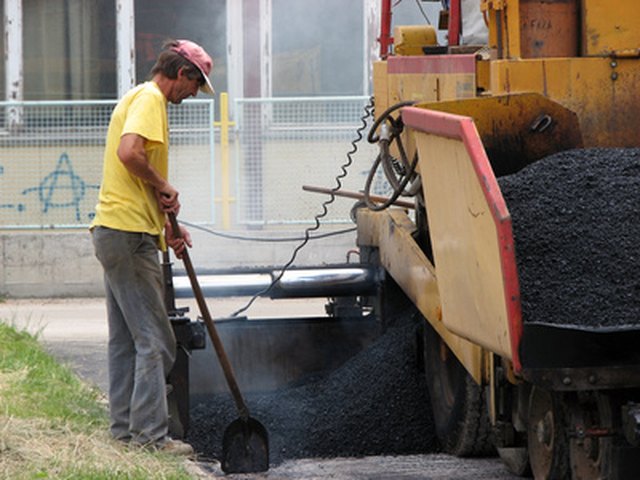How to calculate the weight of asphalt used for paving


Now a day’s asphalt paving is a very popular material as paving. The mostly driveway paving companies also recommend asphalt for paving work as parking lots, residential driveway, or commercial road, etc.
When paving with general asphalt, the weight per cubic meter is said to be about 2.5 tons.
Here, I explain from the calculation process easily why it becomes that figure, and introduce useful knowledge to make it easier to calculate the weight of asphalt in actual construction.
In addition, asphalt has been divided into several types according to characteristics and intended use, the weight per unit will also differ.
I will explain together what kind of asphalt for pavement and what calculation formula of its weight will be.
Table of Contents
Table of contents
- How to calculate the weight of asphalt
- The density of asphalt mixture
- Summary
How to calculate the weight of asphalt
In calculating the weight of asphalt, necessary is the volume and specific gravity. It can be derived by calculating the volume from the construction area and thickness of the asphalt pavement and multiplying the specific gravity of the asphalt used for pavement.
Here, I will explain the basic knowledge which is the prerequisite for weight calculation and the attention abnormal to asphalt.
About specific gravity
“Specific gravity” is a word indicating how heavy an object is with respect to the same volume of water. Since the specific gravity of the reference water is 1 and the weight per square meter is clear as 1 ton, weight can be calculated concisely by multiplying the volume by the specific gravity of the object.
Specific gravity is determined by the “density” of the object. Density is a term expressing the weight per volume of an object, the higher the density, the higher the specific gravity.
Specific gravity becomes very important to calculate the weight of asphalt.
The calculation method for finding weight from volume
When calculating the weight of asphalt by calculation, you can use a method of multiplying the volume by specific gravity.
Volume is obtained by multiplying the construction area by the thickness of the pavement, but usually, the asphalt is pressed slightly because it is treated with a road roller etc. after spreading.
This is called “rolling reduction”, and it is necessary to calculate it taking into account the volume of stepped down. Since the volume decreasing by treading is considered to be approximately 8%, 1.08 is multiplied by the calculation formula as the rolling reduction.
Based on the above, the weight calculation of asphalt is expressed as follows.
Area (m 2) × thickness (m) × specific gravity × rolling reduction (1.08) = weight (t)
Points to note when calculating
In general, asphalt used for paving is called “dense particle size asphalt mixture”.
Although the specific gravity is set to 2.35, the specific gravity determined by the manufacturing company may differ depending on the product asphalt actually used for construction.
Let’s ask the asphalt shipping contractor in advance to ask the gravity to confirm.
The specific gravity also varies depending on the type of asphalt used as described below. The calculation can be done smoothly by checking what kind of asphalt to use at the time of construction.
The density of asphalt mixture
The so-called “asphalt” used for paving is officially called an asphalt mixture and is classified according to density.
Each type of asphalt mixture has different strength and weight.
Differentiation of the asphalt mixture is determined by the size and density (= particle size) of the blended particles, and there are “dense grain asphalt mixture”, “fine grain asphalt mixture” and “open grain asphalt mixture” in order of strength.
Since the strength and properties of asphalt required for paving change, change the type to use according to the required strength.
The type changes according to the ratio of asphalt mixture
The materials that make up the asphalt mixture are as follows.
- “Coarse aggregate”:- A relatively large gravel or crushed stone, with more than 85% left when sieving the eye size to 5 mm filter.
- “Fine aggregate”:- 85% falls through a 5 mm sieve, relatively small gravel, and crushed stone.
- “Filler”:- A fine powder of mineral which further crushed gravel and crushed stone into crushed powder. It has the role of filling the gap between the aggregate.
- “Asphalt”:- Adhesive that summarizes the above aggregate and filler as a connection and completes it as an asphalt mixture. The residue of Petroleum to separate gasoline and heavy oil and purify. If you use cement instead of asphalt for concrete, it becomes concrete.
Depending on the ratio at which these are mixed, we will branch to each kind as introduced in the previous section.
Since the specific gravities of the above materials are different, the specific gravity of the asphalt mixture itself will also change depending on the blending ratio.
The features and uses of each asphalt mixture will be explained below.
Dense particle size Asphalt mixture:
Asphalt pavement which is most often seen in everyday life, it is often used for road paving. It is characterized by large grains mixed, there is an advantage that it is inexpensive and can be constructed in a short period of time.
It is an important characteristic that it is hard to deform, it is resistant to wear, and the anti-slip effect is high.
Fine particle size asphalt mixture:
It is a pave that mixed a lot of smaller grains than those of dense grain size. Because the particles are small and the gaps are small, they are characterized by high water resistance and strong resistance to cracking.
Open grain size Asphalt mixture:
It is a pavement with small grains distributed at low density. Even if the surface compares the above two, it is characterized by being very rough, it is said that it is hard to make a puddle to suck water well.
Moreover, in order to prevent moisture from staying on the surface, it also has the characteristic that the road surface is hard to slip.
The difference in specific gravity and performance of asphalt mixture:
The specific gravity and performance of each general asphalt mixture, the scenes to be used are summarized below.
Dense particle size Asphalt mixture
Specific gravity: 2.35
Performance: The most popular asphalt for paving. Strong, slip resistant, construction is cheap.
Mainly used places: Road with many passengers including national highways. A part with a sharp gradient.
Fine particle size asphalt mixture
Specific gravity: 2.30
Performance: Water resistant to cracking hard. On the other hand, it has difficulty to deform.
Mainly used places: Where heavy trucks such as heavy-duty trucks frequently operate and parking lots.
Open grain size Asphalt mixture
Specific gravity: 1.94
Performance: Water drainage is good, the road surface is easy to dry, so it is difficult to slip. On the other hand, wear resistance is lower to the above.
Mainly used places: Locations where road surfaces are likely to get wet, such as places that are prone to flooding and snowy countries.
Unit weight of asphalt
If you know the specific gravity, you can calculate the weight per volume by weight. Below is the weight per cubic meter of each asphalt mixture.
- About 2.5 tons of dense grain asphalt mixture
- Fine particle size asphalt mixture About 2.4 tons
- Open grain size asphalt mixture About 2.0 tons
The above unit weight is multiplied by the number which is regarded as general gravity to the last.
As mentioned above, it is recommended to listen to manufacturing plants and experts in advance before construction, as the specific gravity of paving asphalt mixtures may differ depending on the manufacturer who manufactures them.
Summary
About the weight calculation of asphalt, the summary is summarized as follows.
- The formula for calculating weight is area × thickness × specific gravity × rolling reduction amount = weight
- Specific gravity may differ depending on the manufacturer of asphalt mixture, so confirmation in advance is required
- There are different types of asphalt mixture for paving, each having different strength, characteristics and specific gravity
The type of asphalt used depends on the purpose of paving and the surrounding environment.
For more information visit our site: https://www.standardpavinginc.com/ or contact us at Phone: (844) – 266 – 7283
